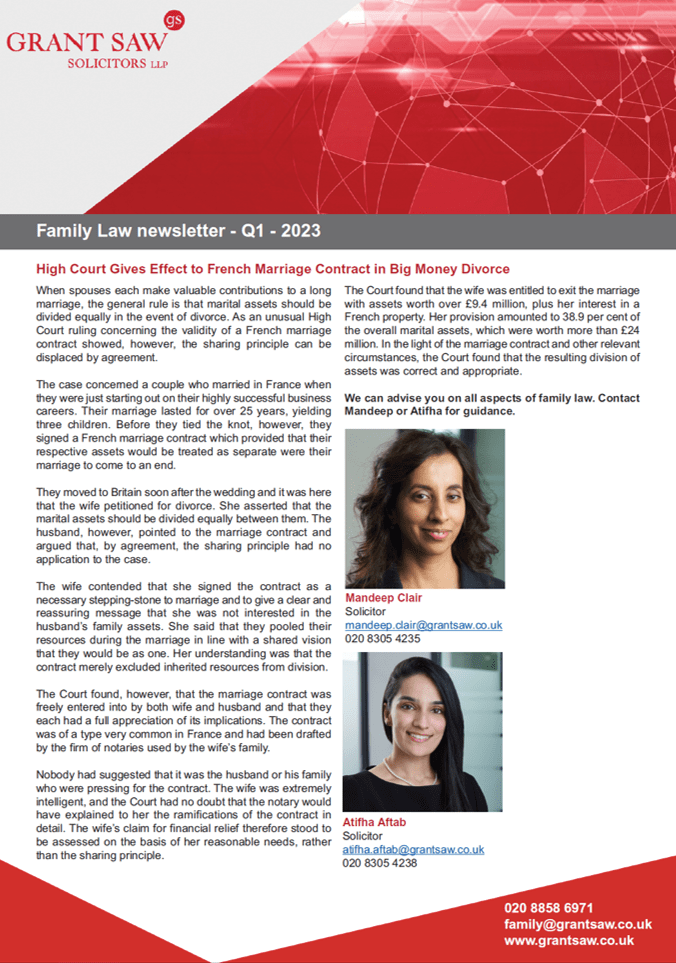OUR FREQUENTLY ASKED QUESTIONS
DO NOT DELETE
DIVORCE
There is only one ground for divorce which is that the marriage has irretrievably broken down. Historically, you had to rely on one of the following 5 reasons for the breakdown of the marriage:
- Adultery
- Unreasonable behaviour
- Desertion
- Separation for at least two years (this requires your spouse to agree to this in writing)
- Separation for at least 5 years
You can apply for a divorce if:
- you have been married for over a year;
- your relationship has permanently broken down;
- your marriage is legally recognised in the UK and
- you have a connection with England & Wales, e.g. you are legally resident here.
It can take between 6- 9 months if everything is agreed. However, it can take longer if there are disagreements regarding finances which need to be resolved.
It depends on whether you are the Applicant or Respondent and whether you wish to obtain legal advice regarding resolving the finances. Please speak to a member of the team about your personal circumstances.
We would encourage you to speak to a family lawyer who would be able to review your circumstances and advise you accordingly. The family team at Grant Saw are specialists in resolving family disputes and would be happy to assist.
If you and your spouse can deal with matters amicably, you will not need to attend contested court hearings. We encourage and assist parties to resolve matters amicably. However, it is important to enter into a court order documenting the financial agreement so as to ensure that it is legally binding. This application is routinely dealt with on paper, without parties attending court.
A conditional order means that the court is satisfied that the application for divorce is sufficient for the grant of a divorce. It does not mean that the couple are divorced. You must wait 20 weeks after your divorce application is issued before applying for a conditional order.
A final order is a legal document which brings the marriage to an end. The applicant can apply for a final order six weeks and a day after the date of the conditional order. If the applicant does not apply, you’ll have to wait an extra 3 months to apply.
COHABITATION
In the event of relationship breakdown, cohabiting couples do not have the same legal rights to property as a married couple. Generally speaking, unmarried couples can’t claim ownership of each other’s property in the event of separation. However, this is a complicated area of law and it is imperative that you seek advice from a family law solicitor with expertise in the area in order to understand your rights.
You and your ex-partner should try to agree arrangements in respect of caring for the children, possibly with the assistance of a mediator and we could make a referral for you in this regard. If you are on the birth certificate, you will have Parental Responsibility and the right to make decisions about your children’s care and upbringing. In the event that you are not, we can assist you in making an application for Parental Responsibility.
It may well be that a court order is required to determine rights of occupation and entitlement to equity. This is not a clear-cut area of law and you should legal advice regarding your specific circumstances.
A cohabitation agreement is a legal agreement between unmarried couples who live together. It sets out arrangements for finances, property and children while you’re living together and if you were to separate.
You should certainly consider entering into a cohabitation agreement if you are intending to live with a partner to whom you are not married. You can make an agreement at any time. Whilst it is advisable to do it before you move in together, you could also enter into an agreement later and particularly if you decide to have children or get a mortgage. A cohabitation agreement may avoid conflict and a costly legal battle in the future.
CHILDREN MATTERS
The court can make various orders including the following:
- child arrangements orders;
- prohibited steps orders; and
- specific issues orders.
If parents are unable to reach an agreement amicably, they should consider mediation. If unsuccessful or inappropriate due to, for example, domestic violence, it is advisable to seek advice from a family law specialist in relation to next steps.
This depends on your circumstances but the starting point is that it is in the children’s best interests to spend time with both parents.
You can talk to your ex-partner about the children at any time you feel comfortable doing so but ideally before you live apart in order to minimise any disruption or uncertainty for the children.
In the majority of cases and unless there is a risk of harm to your child, you are not able to prevent your ex’s new partner from seeing your children. If you believe that your children could be at risk of harm, it may be appropriate to involve the police. It may be appropriate to communicate any concerns to your ex-partner, either directly or through solicitor’s correspondence. This could help to manage an introduction so that it is not confusing for the children.
FINANCIAL SETTLEMENT UPON DIVORCE
It is not compulsory for you to attend mediation, but if you intend to commence court proceedings, you are required to participate in a Mediation Information and Assessment Meeting (MIAM) unless an exemption applies, such as issues of domestic violence, urgency, previous attendance and so on.
You can attempt to reach an agreement with your spouse without contested court proceedings. If an agreement is reached, a draft consent order setting out your proposed agreement, must be lodged at the court for approval.
Parties have an obligation to provide full and frank financial disclosure both during voluntary negotiations and during financial remedy proceedings. Failure to do can make it very difficult for there to be meaningful negotiations as to settlement and can create delay and additional costs. If full and frank financial disclosure is not provided during court proceedings, there could be consequences for the non-disclosing party including the court making adverse inferences, a fine or imprisonment. It is important to obtain legal advice so that consideration can be given to your situation and the options available to you.
The starting point is an equal division of assets but there could be good reasons as to why there should be a departure from equality. The first consideration is given to the welfare of any child of the family under the age of 18 years, but other relevant factors include the length of the marriage, the ages, financial needs and income or financial resources available to each of the parties.
Marriage is considered a joint enterprise and the allocation of roles within the family, whether that be breadwinner or homemaker will very rarely have an impact on the division of assets.
DOMESTIC ABUSE
Domestic Violence can include:
- Physical and sexual abuse;
- Violent or threatening behaviour;
- Psychological or emotional abuse;
- Coercive or threatening behaviour, for example humiliation or intimidation;
- Controlling behaviour; and
- Economic abuse, which includes controlling someone’s possessions or how they earn or spend money.
In certain circumstances, you can seek the court’s protection with an application for a non-molestation order and/or an occupation order. A non-molestation order provides protection against the use of violence or other forms of molestation by a person the order is made against. An occupation order determines the arrangements for sharing a property or excludes a party from the property. An occupation order can require a party to leave the home. If you are in immediate danger of being abused or have been abused, it may be appropriate to report it to the police.
Many kinds of domestic abuse are criminal offences and the police can arrest, caution or charge the perpetrator. Most police stations have Domestic Violence Units or Community Safety Units with specially trained officers to deal with domestic violence and abuse. You can call 999 in an emergency or 101 in a non-emergency or attend a police station in person to report an incident.
In civil proceedings, you can decide to represent yourself or instruct a lawyer to represent you. Either way, the Judge will hear your case and decide whether a protective order should be made.
It depends on your situation. In the event that you need protection imminently and you or any child could potentially be at significant risk by providing the perpetrator with notice of the application, you could apply to the court for an emergency order without notice to the other party. In such a case, the perpetrator would not attend the initial hearing and the injunction could be granted very quickly.
MEDIATION
Mediation in the family law context is a process which allows individuals to negotiate future arrangements with the assistance of a neutral third party.
Mediation can continue while it meets the needs of the individual parties involved. The initial meeting may last 45 minutes and subsequent sessions between 1-2 hours, depending on the complexity of your matter.
The mediator allows the parties to explain their situation, discuss their issues and assists them to reach a settlement.
It depends on the agreement between you and your partner. Some couples share the cost of mediation whilst others agree for the financially stronger party to bear the cost.
It depends on the mediator and we would encourage you to make enquiries with a range of mediators so that you are well informed before making a decision.
Meet the Family Law Services team

Ray Crudgington
Managing Partner
Managing Partner
greenwich
02083054224
ray.crudgington@grantsaw.co.uk

Maria Lati
Partner
Partner and Head of Residential Property
blackheath
02083054229
maria.lati@grantsaw.co.uk

Mike Clary
Family
Partner and Head of Family
greenwich
02083054237
mike.clary@grantsaw.co.uk

Kalpa Prajapati
Partner
Partner and Head of Private Client
blackheath
02083053536
kalpa.prajapati@grantsaw.co.uk

Mario Savvides
Commercial Property
Partner and Head of Commercial Property
greenwich
02083053531
mario.savvides@grantsaw.co.uk

Sarah-Kate Jackson
Litigation
Partner and Head of Litigation
greenwich
02083054236
sarah-kate.jackson@grantsaw.co.uk

Adelaine Nietzold
Private Client
Solicitor
blackheath
02083053530
adelaine.nietzold@grantsaw.co.uk

Adina-Leigh Collins
Litigation
Solicitor
greenwich
02083053556
adina-leigh.collins@grantsaw.co.uk

Aisha Mohammed
Residential Property
Professional Support Lawyer
greenwich
02083054228
aisha.mohammed@grantsaw.co.uk

An Le Tran
Commercial Property
Professional Support Solicitor
greenwich
02083054226
anle.tran@grantsaw.co.uk

Ana-Maria Badeanu
Corporate and Commercial
Solicitor
greenwich
02083053539
ana-maria.badeanu@grantsaw.co.uk

Angela Shaw
Private Client
Solicitor
blackheath
02083054234
angela.shaw@grantsaw.co.uk

Angus Young
Litigation
Solicitor
greenwich
02083054225
angus.young@grantsaw.co.uk

Atifha Aftab
Family
Solicitor
greenwich
02083054238
atifha.aftab@grantsaw.co.uk

Bimal Kotecha
Litigation
Head of Insolvency
greenwich
02083053523
bimal.kotecha@grantsaw.co.uk

Carlos Torres
Commercial Property
Solicitor
greenwich
02083053524
carlos.torres@grantsaw.co.uk

Charlotte Warren
Private Client
Head of Trusts
blackheath
02083054231
charlotte.warren@grantsaw.co.uk

Claire Mac Mahon
Litigation
Solicitor
greenwich
02083053537
claire.macmahon@grantsaw.co.uk

Deborah Taite
Residential Property
Solicitor
blackheath
02083053542
deborah.taite@grantsaw.co.uk

Georgia Beales
Litigation
Paralegal
greenwich
02083054206
georgia.beales@grantsaw.co.uk

Hannah Stevens
Litigation
Solicitor
greenwich
02083053541
hannah.stevens@grantsaw.co.uk

James McKimm
Corporate and Commercial
Solicitor and Head of Corporate Commercial Department
greenwich
02083053526
james.mckimm@grantsaw.co.uk

Jeremy Brooks
Private Client
Solicitor
blackheath
02083053534
jeremy.brooks@grantsaw.co.uk

Joanna Godden
Notary Public
Notary
greenwich
02083083627
joanna.godden@grantsaw.co.uk

Lauren Smith
Employment
Paralegal
greenwich
02083053543
lauren.smith@grantsaw.co.uk

Lisha Gorsia
Commercial Property
Solicitor
greenwich
02083054200
lisha.gorsia@grantsaw.co.uk

Maleeha Iqbal
Residential Property
Licensed Conveyancer
greenwich
02083054232
maleeha.iqbal@grantsaw.co.uk

Mandeep Clair
Family
Solicitor
greenwich
02083054235
mandeep.clair@grantsaw.co.uk

Michael Pope
Corporate and Commercial
Solicitor
greenwich
02083053540
michael.pope@grantsaw.co.uk

Michelle Pinnington
Residential Property
Solicitor
blackheath
02083054216
michelle.pinnington@grantsaw.co.uk

Randeep Thethy
Residential Property
Solicitor
greenwich
02083054209
randeep.thethy@grantsaw.co.uk

Sarah Hogan
Residential Property
Solicitor
blackheath
02083054214
sarah.hogan@grantsaw.co.uk

Simona Bishop
Litigation
Solicitor
greenwich
02083053521
simona.bishop@grantsaw.co.uk

Tatiana Zenina
Private Client
Solicitor
blackheath
02083054239
tatiana.zenina@grantsaw.co.uk

Trisha Djemal
Residential Property
Consultant Solicitor
blackheath
02083053546
trisha.djemal@grantsaw.co.uk

Tyrone Grant
Residential Property
Head of Leasehold Enfranchisement
blackheath
02083053522
tyrone.grant@grantsaw.co.uk

Denise
Accounts Staff
greenwich
02088586971
enquiries@grantsaw.co.uk

Jamie
Support Staff
Head of IT
greenwich
02088586971
enquiries@grantsaw.co.uk

Kasia
Accounts Staff
greenwich
02088586971
enquiries@grantsaw.co.uk

Janet Gomes
Support Staff
HR Manager
greenwich
02083054233
janet.gomes@grantsaw.co.uk

Michael Tobin
Support Staff
Marketing and Business Development Manager
greenwich
02083053550
michael.tobin@grantsaw.co.uk

Sue Holness
Support Staff
Customer Services
greenwich
02083054221
sue.holness@grantsaw.co.uk





